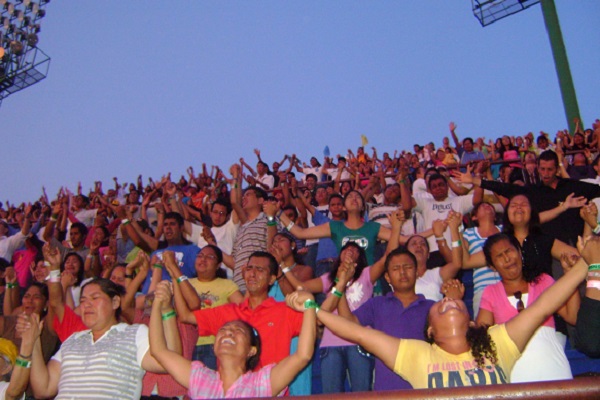
Brazilians Turning to Evangelical Church
- By Gary Nguyen --
- 12 Aug 2018 --
![By Rayttc [CC BY-SA 3.0 ], from Wikimedia Commons](https://www.worldreligionnews.com/wp-content/uploads/2018/08/2048px-Congreso_Nacional_Juvenil3.jpg)
Conservatism is on the rise in Brazil.
The evangelical church has captured huge tracts of spiritual territory in Brazil[/tweetit], a predominantly Catholic nation. The numbers say it all: in 1991, only nine percent of the Brazilian Christian population identified themselves as evangelicals. In 2010, it rose to a massive 20 percent. The survey by Instituto Brasileiro de Geografia e Estatística in cooperation with Fundacao Getulio Vargas also showed that the number of people who identified as Catholics dropped to 68 percent from 83 percent during the same period.
Brazilians Turning to Evangelical Church[/tweetthis]
Poverty is a major contributor to the rise of evangelism. Rural Brazil is far from the first sight of palm groves, rice-fields, and mango trees. They are the places where alcohol and drug abuses are common. They corrode the ambition of young Brazilians, pushing them towards narcotics and booze. Many have found refuge in religion. Even small population centers have more than a dozen worship places, ranging from small rooms doubling up as churches to substantial structures. These churches compete with an exploding number of bars, ranging the gamut from formal to ramshackle.
Needless to say, the excessive presence of churches have made their mark in the South American nation's politics and society. The evangelicals hold undue political influence. As per the Interunion Parliamentary Advisory Department, the Brazilian Congressional evangelical caucus has risen by half compared to the previous term. About three senators and 63 representatives are now with evangelical policies in the caucus. It is to be noted that the caucus accepts those only with direct church memberships. Neo-Pentecostals the quickest expanding group among the evangelical grouping.
The rise of churches in Brazil took place as ordinary Brazilians looks at politicians with disdain. The country has faced a huge corruption scandal and suffered a deep recession. Violent crime has now reached epidemic proportions. The government has been accused of failing its citizens. Brazilians thus have now looked towards churches for solace. The church, in turn, recruits young Brazilians to its cause.
Social and political conservatism is now surely on the rise. In 2010, opinions regarded as conservative were held by 49 percent of the people. In 2016, it has jumped to 54 percent. The trend towards the right is more marked when it comes to law and order. An increasing number of Brazilians favor the legalization of capital punishment. They also lower the age at which juvenile criminals could be legally tried as adults. They also favor life imprisonment sans parole for heinous crime committing criminals.



















